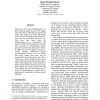23 search results - page 3 / 5 » An End-to-End Supervised Target-Word Sense Disambiguation Sy... |
CICLING
2009
Springer
14 years 5 months ago
2009
Springer
We propose a supervised word sense disambiguation (WSD) system that uses features obtained from clustering results of word instances. Our approach is novel in that we employ semi-s...
COLING
2002
13 years 5 months ago
2002
In this paper, a supervised learning system of word sense disambiguation is presented. It is based on conditional maximum entropy models. This system acquires the linguistic knowl...
CORR
2004
Springer
13 years 5 months ago
2004
Springer
This paper describes the National Research Council (NRC) Word Sense Disambiguation (WSD) system, as applied to the English Lexical Sample (ELS) task in Senseval-3. The NRC system ...
COLING
2008
13 years 6 months ago
2008
We propose a supervised word sense disambiguation (WSD) method using tree-structured conditional random fields (TCRFs). By applying TCRFs to a sentence described as a dependency t...
ACL
2008
13 years 6 months ago
2008
Supervised word sense disambiguation requires training corpora that have been tagged with word senses, which begs the question of which word senses to tag with. The default choice...

